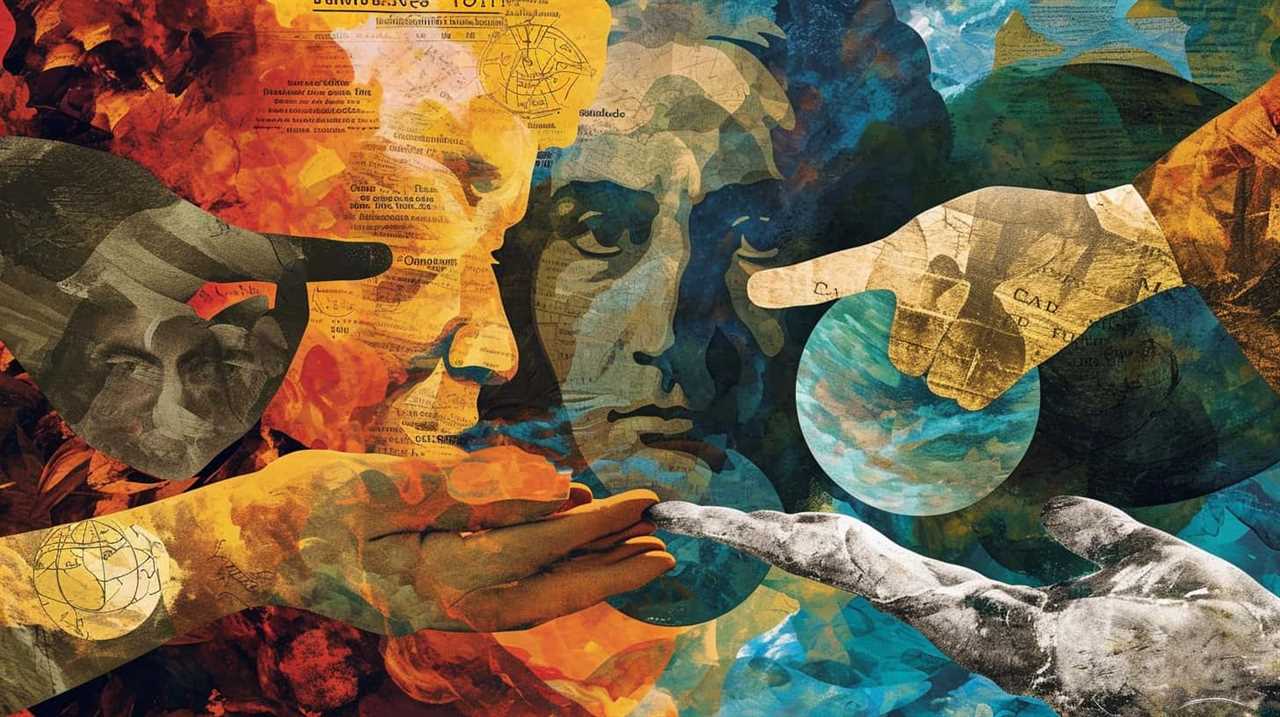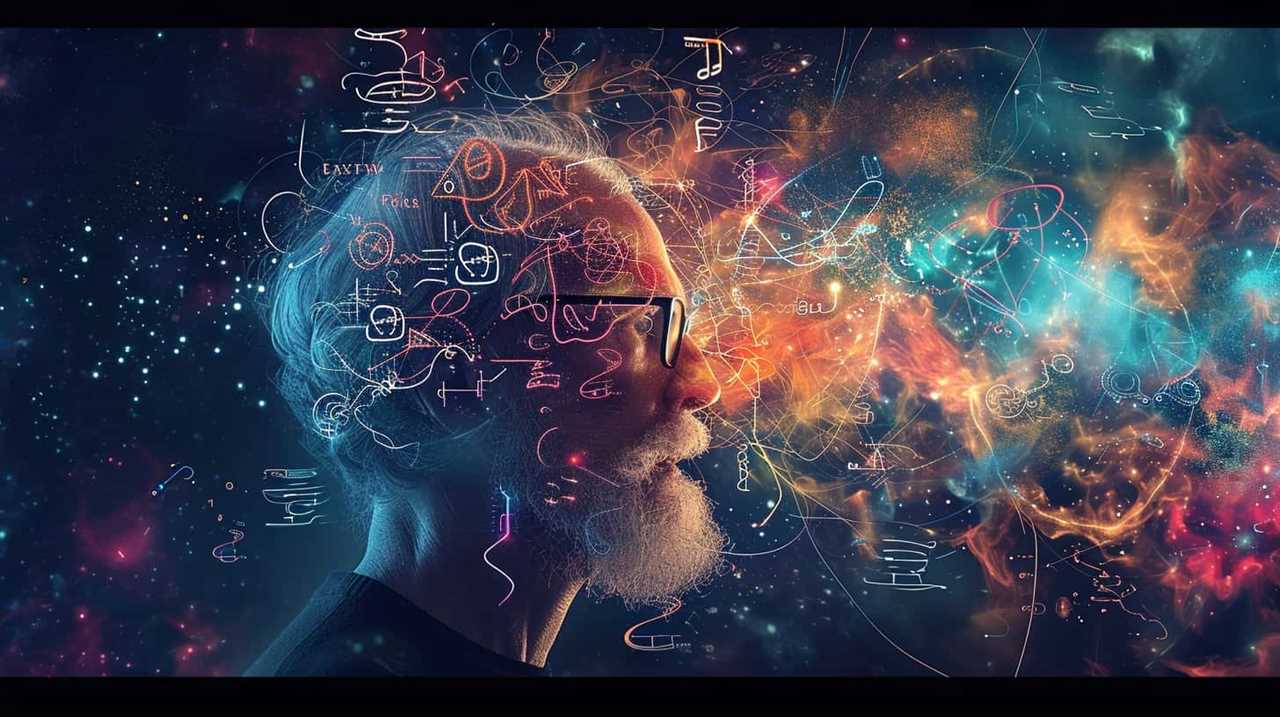Philosophers Quotations
Classic Quotes on Science and Philosophy History

In the world of science and philosophy, we explore the depths of history, revealing profound discoveries that influence our perception of the world.
Welcome to ‘Classic Quotes on Science and Philosophy History.’ Here, we embark on a quest to discover the timeless wisdom bestowed upon us by the greatest minds in human history.
From Aristotle’s eloquent musings on nature’s mysteries to Descartes’ contemplations on knowledge’s foundations, we explore the depths of intellectual innovation.
Einstein’s revolutionary insights into the universe’s secrets and Kant’s profound thoughts on reason and reality await our eager minds.
But let us not forget Nietzsche’s piercing critique of science and morality, challenging us to question conventional wisdom.
Join us on this transformative journey as we delve into the depths of human understanding, seeking inspiration and enlightenment.
Key Takeaways
- Aristotle’s teleological view emphasizes purpose and design in nature.
- Descartes challenged traditional understandings of knowledge and reality.
- Einstein’s theories reshaped our understanding of space, time, and gravity.
- Kant’s philosophy explored reason and reality.

Aristotle’s Wisdom on Nature
In exploring Aristotle’s wisdom on nature, we find that he delves into the intricacies and interconnectedness of the natural world. Aristotle’s teleological view, which emphasizes purpose and design in nature, greatly influenced his understanding of biology. He believed that everything in nature has a purpose and exists for a reason.
Aristotle’s influence on biology is profound and continues to shape our understanding of the natural world. His ideas on classification and taxonomy laid the foundation for modern biology. He categorized living organisms based on their similarities and differences, providing a systematic approach to studying and understanding the diversity of life.
Furthermore, Aristotle’s emphasis on observation and empirical evidence paved the way for the scientific method. His belief in the importance of studying nature firsthand and making careful observations set the stage for the development of modern scientific inquiry.
In summary, Aristotle’s teleological view and his influence on biology have had a lasting impact on our understanding of nature. His ideas on purpose and design, classification, and empirical observation continue to shape the field of biology and inspire innovation in our exploration of the natural world.
Transitioning to Descartes’ reflections on knowledge, we now turn our attention to another influential thinker who challenged traditional understandings of knowledge and reality.

Descartes’ Reflections on Knowledge
Descartes’ reflections on knowledge challenge traditional understandings and prompt us to question the foundations of our beliefs. His skepticism and exploration of Cartesian dualism revolutionized the way we think about the nature of knowledge and reality.
Descartes, a renowned philosopher and mathematician of the 17th century, embarked on a quest to establish a solid foundation for knowledge. He doubted everything he’d previously believed, rejecting the reliability of his senses and the certainty of his perceptions. This radical skepticism led him to the famous conclusion, ‘I think, therefore I am,’ which became the cornerstone of his philosophy.
Descartes’ skepticism went beyond mere doubt. He aimed to strip away all preconceived notions and arrive at indubitable truths. By employing the method of doubt, he sought to build a new system of knowledge based on reason and rationality.
One of Descartes’ key contributions was his theory of Cartesian dualism, which posited that the mind and body are separate entities. This duality challenged the prevailing view of the time, which considered the mind and body as intertwined.
Descartes’ reflections on knowledge continue to influence contemporary philosophy and science. His skepticism reminds us to critically examine our beliefs, while his exploration of the mind-body problem raises profound questions about the nature of consciousness and the relationship between the physical and the mental.
Transitioning into Einstein’s insights on the universe, we can see parallels between Descartes’ exploration of knowledge and Einstein’s revolutionary theories that reshaped our understanding of space, time, and gravity.

Einstein’s Insights on the Universe
Einstein’s theories revolutionized our understanding of the universe, reshaping our perception of space, time, and gravity. His groundbreaking insights on the universe have had a profound impact on scientific progress and our quest for knowledge. Here are four key aspects of Einstein’s theories that have transformed our understanding of the cosmos:
- Space-time continuum: Einstein’s theory of general relativity introduced the concept of a unified space-time framework. According to this theory, space and time aren’t separate entities but rather interconnected dimensions that are influenced by the presence of mass and energy. This revolutionary idea laid the foundation for our modern understanding of the fabric of the universe.
- The curvature of space: Einstein’s theory of general relativity proposed that massive objects can curve the fabric of space-time, causing objects to follow curved paths. This concept explains the phenomenon of gravity and provides a deeper understanding of how celestial bodies interact with each other.
- Time dilation: Einstein’s theory of special relativity revealed that time can be affected by motion and gravity. Time dilation occurs when an object moves at a high speed or experiences a strong gravitational field, causing time to pass differently relative to an observer in a different frame of reference. This insight has profound implications for our understanding of the nature of time itself.
- Cosmological constant: Einstein initially introduced the cosmological constant to his theory of general relativity as a way to counteract the force of gravity and maintain a static universe. While he later abandoned this concept, it has since been revisited and plays a role in our current understanding of the expansion of the universe.
Einstein’s theories continue to inspire and challenge scientists to push the boundaries of our knowledge. His insights have revolutionized our understanding of the universe, paving the way for new discoveries and innovations that continue to shape the world of science.

Kant’s Thoughts on Reason and Reality
Continuing our exploration of the intertwined realms of science and philosophy, let’s delve into Kant’s profound insights on reason and reality.
Immanuel Kant, one of the most influential figures in Western philosophy, offered a groundbreaking critique of reason and perception in his work. According to Kant, reason isn’t simply a passive tool for acquiring knowledge, but an active force that shapes our understanding of reality.
Kant’s critique begins with the recognition that our perception of the world isn’t a direct reflection of reality. Instead, he argues that our experience of the world is mediated through the categories of our understanding. These categories, such as time, space, and causality, structure our perception and help us make sense of the world. In other words, our understanding of reality isn’t determined solely by the external world, but is also shaped by the innate structures of our mind.
Furthermore, Kant argues that reason goes beyond the limits of our sensory experience. While our senses provide us with information about the empirical world, reason enables us to engage with concepts that are beyond our immediate experience. Through reason, we can contemplate abstract ideas, engage in moral reasoning, and explore the nature of existence itself.
In conclusion, Kant’s thoughts on reason and reality challenge us to reconsider the relationship between our perception and the external world. His critique emphasizes the active role of reason in shaping our understanding and highlights the limitations of our sensory experience.
As we move forward in our exploration of the intertwined realms of science and philosophy, let’s now turn our attention to Nietzsche’s critique of science and morality.

Nietzsche’s Critique of Science and Morality
In our exploration of the intertwined realms of science and philosophy history, we now turn our attention to Nietzsche’s critique of science and morality. Nietzsche was a philosopher who challenged the prevailing ideas of his time, including the positivist approach to science and the concept of objective morality.
Here are four key points that highlight Nietzsche’s critique:
- Critiquing positivism: Nietzsche rejected the positivist belief that science could provide ultimate objective truths about the world. He argued that scientific knowledge is always influenced by subjective perspectives and interpretations.
- Questioning objectivity: Nietzsche also questioned the idea of objective morality. He argued that moral values aren’t universal or fixed, but rather a product of human interpretation and societal influences. According to Nietzsche, morality is a human creation that varies across different cultures and historical periods.
- Beyond good and evil: Nietzsche’s critique of morality went beyond questioning objectivity. He argued that traditional moral values, such as good and evil, restrict individual freedom and hinder human potential. Nietzsche advocated for a reevaluation of values based on individual self-creation and the affirmation of life.
- The will to power: Central to Nietzsche’s critique was the concept of the ‘will to power.’ He believed that all human actions are driven by a desire for power and dominance. This critique challenged the notion of selfless actions and altruism, emphasizing the inherent selfishness and striving for power in human nature.
Nietzsche’s critique of science and morality continues to inspire debates and discussions in the fields of philosophy and science. His ideas invite us to question the foundations of our knowledge and moral systems, encouraging a more nuanced and critical approach to understanding the world.

Frequently Asked Questions
What Were Some of Aristotle’s Other Contributions to the Field of Philosophy Besides His Thoughts on Nature?
Aristotle’s contributions to philosophy extend beyond his thoughts on nature. His ethics and metaphysics are also significant. His ethical theories focused on the pursuit of the good life, while his metaphysics explored the nature of reality and existence.
How Did Descartes’ Reflections on Knowledge Impact the Development of Modern Philosophy?
Descartes’ reflections on knowledge had a profound impact on modern philosophy. His skeptical approach challenged traditional beliefs and paved the way for a new era of critical thinking. His influence on philosophy continues to shape our understanding of the world.
Can You Explain Einstein’s Theory of Relativity and Its Significance in Understanding the Universe?
Einstein’s theory of relativity revolutionized our understanding of the universe. It explains how space and time are intertwined and how gravitational effects shape the fabric of the cosmos. Its significance lies in its ability to reveal the fundamental nature of reality.
What Were Some of Kant’s Other Philosophical Ideas About Reason and Reality?
Kant’s concept of synthetic a priori and his theory of moral philosophy provide insight into reason and reality. By examining the interplay between knowledge and experience, Kant unveils the profound connection between our understanding of the world and our moral obligations.
How Did Nietzsche’s Critique of Science and Morality Influence Later Philosophical Thought?
Nietzsche’s critique of science and morality profoundly influenced later philosophical thought. His questioning of objective truth and traditional moral values challenged the foundations of philosophy, paving the way for new perspectives and innovative approaches to understanding reality and ethics.

Can you provide some classic quotes on science and philosophy from your collection?
Certainly! Here are a few timeless classics from our great minds on science collection: 1. “The only true wisdom is in knowing you know nothing.” – Socrates 2. “Science is organized knowledge.” – Herbert Spencer 3. “In questions of science, the authority of a thousand is not worth the humble reasoning of a single individual.
Conclusion
In the grand tapestry of human thought, these classic quotes on science and philosophy history serve as both guideposts and cautionary tales.
From Aristotle’s profound insights on nature to Descartes’ introspective reflections on knowledge, each voice adds a layer of complexity to our understanding of the world.
Einstein’s cosmic revelations, Kant’s deep musings on reason and reality, and Nietzsche’s provocative critiques of science and morality further challenge our assumptions.
Let’s embrace the irony of their wisdom, for it’s through these contradictions that we unravel the mysteries of existence.
Lauren’s talent in writing is matched by her passion for storytelling. Her love for books and deep understanding of culture and entertainment add a distinct flavor to her work. As our media and press contact, Lauren skillfully bridges the gap between afterQuotes and the broader media landscape, bringing our message to a wider audience.
Philosophers Quotations
Top Philosophy of Technology Quotes Unveiled

Would you like to explore the captivating realm of technology philosophy?
In our quest for innovation, we have uncovered a treasure trove of thought-provoking quotes that will challenge your perception of the relationship between humans and machines.
Picture this: a renowned philosopher discussing the ethical implications of artificial intelligence, or a thought experiment that questions the role of science in shaping technological advancements.
These quotes will inspire you to think critically about the nature of technology and its impact on our lives.
Join us as we unveil the top philosophy of technology quotes that will ignite your curiosity and push the boundaries of innovation.
Key Takeaways
- Technology is a powerful tool that can enhance our lives, but it also has existential implications and raises questions about our sense of self and authentic identity.
- Technology has a significant impact on social relationships, shaping the way we connect, communicate, and interact with others. It can both enhance and hinder social connections, so balancing technology use with meaningful human interactions is crucial.
- Ethical considerations are essential in the development and use of technology, including issues of privacy, data security, accessibility, and minimizing environmental consequences.
- The interplay between science and technology is crucial for innovation and societal progress. Science provides the knowledge and understanding for technological development, while technology pushes the boundaries of scientific knowledge and challenges existing theories.

The Nature of Technology
In our exploration of the philosophy of technology, we’ll delve into the essence and characteristics of technology itself. Technology, in its simplest form, can be seen as a tool or an instrument created by humans to solve problems and enhance our lives. However, when we engage in a deeper philosophical analysis of technology, we uncover its existential implications and the profound impact it has on our existence.
Technology has become an integral part of our daily lives, shaping the way we communicate, work, and interact with the world around us. It has transformed the very fabric of our society, blurring the boundaries between the physical and virtual realms. But what does this mean for our sense of self? How does technology shape our understanding of identity and our place in the world?
Existential implications arise when we consider the ways in which technology mediates our experiences and influences our perception of reality. As we become increasingly reliant on technology, we must question whether it’s enhancing or detracting from our human essence. Are we losing touch with our authentic selves as we become more immersed in a digital world?
This philosophical analysis of technology forces us to confront the complex relationship between humanity and its creations. It challenges us to think critically about the role technology plays in defining who we’re and how we navigate our existence. As we continue to innovate and push the boundaries of what’s possible, we must also consider the profound philosophical questions that arise from our ever-evolving technological landscape.

The Role of Science in Technology
Science plays a crucial role in shaping and advancing technology. It serves as the foundation upon which innovation thrives, pushing the boundaries of what is possible and propelling society forward. The role of science in technology is two-fold: it provides the knowledge and understanding necessary to develop new technologies, and it also serves as a guide for ethical considerations in their creation and use.
Scientific progress fuels technological advancements by uncovering new principles, theories, and laws that underpin the development of innovative solutions. Through rigorous experimentation, observation, and analysis, scientists expand our understanding of the natural world and provide the building blocks for technological innovation. This constant pursuit of knowledge allows us to unlock the full potential of technology and create solutions that address the complex challenges we face.
However, the role of ethics must also be considered in the development and application of technology. As science progresses, it is essential to reflect on the ethical implications of our technological advancements. This requires us to question not only what we can do, but also what we should do. Ethical considerations ensure that technology is used responsibly, to benefit society as a whole while minimizing harm.
To better illustrate the relationship between science and technology, let’s consider the following table:
| Science | Technology |
|---|---|
| Provides the knowledge and understanding necessary for innovation | Applies scientific knowledge to create practical solutions |
| Driven by curiosity and the pursuit of knowledge | Driven by problem-solving and meeting societal needs |
| Explores the natural world and uncovers new principles and laws | Utilizes scientific knowledge to develop new tools, products, and systems |
| Informs ethical considerations and responsible use of technology | Requires ethical considerations to guide development and use |
| Expands our understanding of the world and propels technological advancements | Transforms scientific knowledge into practical applications for societal progress |
The interplay between science and technology is integral to our quest for innovation. As we continue to make scientific discoveries, we must harness this knowledge and apply it ethically to shape a future where technology serves the greater good. By recognizing the role of ethics in scientific progress, we can ensure that our technological advancements align with our values and contribute to a more sustainable and equitable world.

Human-Machine Interaction
As we explore the intriguing realm of Human-Machine Interaction, we’re confronted with the ethical implications of AI and its impact on social relationships.
The rise of artificial intelligence has sparked intense debates about the boundaries and responsibilities of technology.
From autonomous vehicles making life-or-death decisions to algorithms shaping our online experiences, we find ourselves questioning the extent to which we should rely on machines and how they may reshape the fabric of our society.
Ethical Implications of AI
One can’t underestimate the ethical implications of AI in our interaction with machines. As technology continues to advance, it’s crucial to consider the ethical responsibilities that come with the development and usage of AI.
One key concern is algorithmic bias, which refers to the potential for AI systems to perpetuate and amplify existing biases in society. This bias can lead to unfair treatment and discrimination, impacting individuals and communities. It’s our ethical responsibility to ensure that AI algorithms are trained and tested in a way that minimizes bias and promotes fairness and equality.
As we navigate the complex landscape of AI, we must prioritize ethical considerations and actively work towards creating AI systems that are transparent, accountable, and aligned with our values. Only then can we truly harness the transformative potential of AI while safeguarding against its unintended consequences.
Impact on Social Relationships
Technology’s impact on social relationships necessitates a thoughtful evaluation of human-machine interaction. As we increasingly rely on technology for communication and connection, it’s crucial to consider the consequences it has on our social dynamics.
Two key areas that highlight this impact are online dating and cyberbullying.
Online dating has revolutionized the way people meet and form romantic relationships. It offers a convenient platform to connect with potential partners, expanding the possibilities of finding love. However, it also raises questions about authenticity and trust. How can we truly know someone through a digital interface? Are we sacrificing genuine human connection for the convenience of swiping right?
On the other hand, cyberbullying has emerged as a dark consequence of increased online interaction. The anonymity provided by technology has given rise to a new form of harassment, causing significant harm to individuals and communities. It challenges us to find ways to protect and support victims while also addressing the root causes of this behavior.

Ethics and Technology
As we explore the subtopic of Ethics and Technology, we must confront the moral implications that arise from our increasingly interconnected world.
The ethical use of artificial intelligence is a pressing concern, as we must ensure that these technologies prioritize human well-being and autonomy.
Additionally, the issue of privacy in the digital age demands our attention, as we navigate the delicate balance between convenience and safeguarding personal information.
Moral Implications of Technology
We are concerned with the ethical implications of technology. As technology continues to advance at an unprecedented pace, it becomes increasingly important to consider the moral responsibility and ethical decision-making that accompany these advancements.
Here are four key points to consider:
- Impact on Society: Technology has the power to shape society in profound ways. From social media algorithms that influence our beliefs to automation that affects employment, we must carefully consider the ethical implications of these technologies.
- Privacy and Data Security: With the rise of digital platforms, the collection and use of personal data have become prevalent. It’s crucial to address the ethical concerns surrounding privacy and data security, ensuring that individuals’ rights are protected.
- Equity and Access: Technology has the potential to bridge gaps and empower marginalized communities. However, we must ensure that advancements are accessible to all and don’t exacerbate existing inequalities.
- Environmental Consequences: The production and use of technology can have significant environmental impacts. Ethical considerations should be made to minimize harm and promote sustainable practices.
In navigating the moral implications of technology, it’s essential to prioritize ethical decision-making, promoting innovation that aligns with our values and respects the well-being of individuals and the planet.
Ethical Use of AI
The ethical use of AI is a pressing concern in our rapidly advancing technological landscape. As artificial intelligence continues to evolve and permeate various aspects of our lives, it becomes imperative to address the ethical implications that arise from its use.
AI ethics refers to the moral principles and guidelines that govern the development and deployment of artificial intelligence systems. Responsible AI development requires careful consideration of issues such as privacy, bias, accountability, and transparency.
It’s crucial to ensure that AI systems are designed to promote fairness, mitigate biases, and respect individual autonomy. As we strive for innovation and progress, it’s essential to remember that ethical considerations should always be at the forefront of AI development, guiding us towards a future where technology serves humanity in a responsible and beneficial manner.
Privacy in Digital Age
Privacy in the digital age is a fundamental concern when considering the ethical implications of technology. As our lives become increasingly intertwined with digital platforms and devices, it’s crucial to examine the ways in which our personal information is collected, stored, and used.
Here are four key points to consider:
- Data ownership: In the digital age, our personal data is often collected without our explicit consent. This raises important questions about who owns our data and how it can be used by corporations and governments.
- Surveillance capitalism: The rise of surveillance capitalism has further eroded our privacy. Companies profit by collecting and analyzing vast amounts of personal data, often without our knowledge or consent.
- Ethical implications: The widespread collection and use of personal data raise ethical concerns, including issues of autonomy, consent, and the potential for discrimination.
- Balancing privacy and innovation: While privacy is essential, it’s important to strike a balance between protecting personal information and promoting innovation. Finding ways to safeguard privacy without stifling technological progress is a challenge we must address.

Technological Determinism
Examining the impact of technology on society, we explore the concept of Technological Determinism. This theory suggests that technology is the primary driver of societal change and that it shapes the way we think, behave, and interact with one another. According to technological determinists, advancements in technology have profound societal consequences that are beyond our control.
In today’s fast-paced world, technology’s impact on society is undeniable. It has revolutionized the way we communicate, work, and live our lives. The rise of social media, for example, has transformed the way we connect with others, share information, and form opinions. The advent of smartphones has made information accessible at our fingertips, changing the way we consume news, shop, and even navigate our surroundings.
However, technological determinism raises important questions about agency and responsibility. If technology is the main driving force behind societal change, what role do individuals and institutions play in shaping that change? Are we simply passive recipients of technological advancements, or do we have the power to influence the direction and impact of technology on society?
As we navigate the ever-evolving technological landscape, it’s crucial to critically examine the societal consequences of technological determinism. While technology has the potential to empower and improve our lives, it also has the power to exacerbate existing inequalities and create new challenges. By understanding and actively shaping the impact of technology, we can ensure that it serves the greater good and promotes a more equitable and inclusive society.

The Impact of Technology on Society
When considering the impact of technology on society, two key points come to mind: the influence of social media and the implications of technological advancements on employment.
Social media has revolutionized the way we communicate and connect, shaping our interactions and even our sense of self.
Additionally, as technology advances at an unprecedented rate, there’s growing concern about the displacement of jobs and the need for new skills to adapt to the changing landscape.
These points highlight the complex and transformative nature of technology and its profound effects on society.
Social Media’s Influence
In our digital age, the influence of social media on society has become a prevalent and undeniable phenomenon. As we navigate the vast landscape of online platforms, it’s crucial to understand the profound impact they’ve on our lives. Here are four key aspects to consider:
- Influence on Mental Health: Social media can both positively and negatively affect our mental well-being. While it provides a platform for connection and support, excessive use can lead to feelings of loneliness, anxiety, and depression.
- Spread of Misinformation: The rapid dissemination of information on social media has resulted in the widespread propagation of fake news and misinformation. This poses a significant challenge to society, as it can shape public opinion and distort our understanding of reality.
- Amplification of Voices: Social media has given a voice to marginalized groups and facilitated social movements. It has become a powerful tool for advocacy, enabling individuals to share their experiences, raise awareness, and mobilize for change.
- Privacy Concerns: The digital nature of social media raises concerns about privacy and data security. Our personal information is often collected and used for targeted advertising, raising questions about consent and control over our own data.
As we grapple with the influence of social media, it’s essential to strike a balance between its benefits and drawbacks, leveraging its potential for innovation while being mindful of its impact on our society.
Technological Advancements and Employment
As we delve deeper into the impact of technology on society, we must address the transformation of employment brought about by technological advancements. Automation and job displacement are two key factors that have redefined work in the digital age. The rise of machines and artificial intelligence has led to the automation of many tasks previously performed by humans. While this has increased efficiency and productivity, it has also led to job losses and a shift in the labor market. To better understand the impact, let’s take a look at the table below:
| Automation | Job Displacement |
|---|---|
| Increases productivity and efficiency | Leads to job losses |
| Reduces human error | Shifts the labor market |
| Enhances precision and accuracy | Requires workers to adapt and learn new skills |
| Streamlines processes | Raises questions about the future of work |
| Can lead to cost savings | Sparks debates on income inequality |
As technology continues to advance, it is crucial that we find ways to adapt and redefine work in the digital age. This may involve reskilling and upskilling workers to ensure they have the necessary skills to thrive in a technology-driven world. Additionally, it is important to address the social and economic implications of job displacement and find ways to mitigate its impact. By embracing innovation and actively shaping the future of work, we can create a society that utilizes technology to its fullest potential while ensuring that no one is left behind.

Technological Progress and Innovation
We frequently embrace technological progress and innovation as it enhances our lives and propels us towards a more advanced future. However, as we marvel at the latest gadgets and advancements, it’s crucial to consider the ethical implications and societal impact of such progress. Here are four thought-provoking points to ponder:
- Technological ethics: With every new development, we must question the ethical implications. Are we sacrificing our privacy and personal freedoms in exchange for convenience? Are we creating technologies that have the potential to harm or discriminate against certain groups? It’s vital to ensure that our technological advancements align with our moral values.
- Societal impact: While technology brings numerous benefits, it also has the power to disrupt and reshape societies. We must carefully analyze the consequences of our innovations. Will automation lead to widespread unemployment? How will artificial intelligence affect human relationships and social dynamics? By considering the broader societal impact, we can make informed decisions about the technologies we embrace.
- Unintended consequences: Technological progress often comes with unforeseen consequences. From environmental degradation to increased inequality, our advancements can have unintended negative effects. It’s crucial to anticipate and mitigate these consequences to avoid exacerbating existing problems.
- Balancing progress and caution: While innovation is essential, we must strike a balance between progress and caution. We need to foster an environment that encourages creativity and innovation while also ensuring responsible development and implementation. By doing so, we can harness the benefits of technological progress while minimizing its potential pitfalls.
As we continue to push the boundaries of technological advancements, let’s not forget the importance of considering technological ethics and the societal impact of our innovations. Only by doing so can we ensure that our progress truly enhances our lives and creates a better future for all.

The Relationship Between Science and Technology
The dynamic interaction between science and technology plays a pivotal role in driving societal progress and shaping our future. Science and technology are intertwined in a complex relationship, with each influencing and relying on the other. While science is the pursuit of knowledge through systematic methods and experimentation, technology is the application of knowledge to create practical solutions. Together, they push the boundaries of human understanding and propel us towards new possibilities.
| Science | Technology |
|---|---|
| Explores the natural world | Applies scientific knowledge |
| Seeks to understand the fundamental laws | Transforms scientific discoveries |
| Uncovers the limits of scientific knowledge | Enhances scientific research |
Science sets the foundation for technological advancements by uncovering the fundamental laws that govern the natural world. However, it also faces limitations in its ability to provide complete understanding. This is where technology steps in, leveraging scientific knowledge to create innovative solutions and push the boundaries of scientific discovery.
The role of technology in scientific discovery cannot be overstated. It enables scientists to collect and analyze vast amounts of data, simulate complex phenomena, and develop sophisticated instruments. These advancements in technology empower scientists to explore new frontiers, challenge existing theories, and make groundbreaking discoveries.
As we delve into the philosophy of information technology, it becomes evident that the relationship between science and technology is symbiotic. They rely on each other for progress and breakthroughs. The interplay between the two fuels innovation and propels us towards a future where the limits of scientific knowledge are constantly being pushed, thanks to the transformative power of technology.

Philosophy of Information Technology
Moving from the relationship between science and technology, we now delve into the fascinating realm of the philosophy of information technology. In this thought-provoking field, we explore the intersection of philosophy and computer science, and examine the ethical implications of information technology.
Here are four key aspects of the philosophy of information technology that will surely captivate the innovative minds of our audience:
- The nature of information: We contemplate the fundamental nature of information and its significance in the digital age. Is information a physical entity, or does it exist independently of its medium?
- The ethics of information technology: We analyze the ethical dilemmas that arise in the realm of information technology. How do we balance privacy concerns, security measures, and the potential for surveillance in the digital landscape?
- The impact on human experience: We ponder how information technology shapes our perceptions and interactions with the world. How does the constant flow of information affect our cognition, relationships, and overall well-being?
- The future of information technology: We speculate on the future developments and implications of information technology. Will artificial intelligence and automation redefine our understanding of information and its role in society?
As we transition into the next section on the philosophy of artificial intelligence, let’s continue our exploration of the profound philosophical questions that arise in the realm of technology and its impact on humanity.

Philosophy of Artificial Intelligence
Now let’s delve into the captivating realm of the philosophy of artificial intelligence, where we explore the ethical implications and philosophical questions surrounding this groundbreaking field.
Artificial intelligence, or AI, has become an integral part of our lives, revolutionizing various industries and shaping our future. However, it’s essential to critically examine the limitations and philosophical implications of AI.
One of the key limitations of AI lies in its ability to truly understand and replicate human intelligence. While AI systems can perform complex tasks and process vast amounts of information, they lack the fundamental understanding and consciousness that humans possess. This raises philosophical questions about the nature of consciousness and the essence of being human.
Furthermore, the ethical implications of AI are of great concern. As AI becomes more advanced and autonomous, questions arise about the moral responsibility and accountability of AI systems. Should AI systems be held responsible for their actions? How can we ensure that AI is programmed to act ethically and in alignment with human values?
These philosophical implications highlight the need for ongoing dialogue and reflection on the development and implementation of AI. As we embrace innovation and progress, it’s crucial to consider the ethical dimensions and philosophical implications of artificial intelligence, ensuring that it serves humanity’s best interests.

The Future of Technology
Our exploration of the philosophy of technology takes us into the realm of the future, where we envision the transformative potential of technology in shaping our lives. As we look ahead, it’s important to consider the future advancements that await us and the concept of technological singularity.
Here are four thought-provoking insights about the future of technology:
- Unprecedented Connectivity: The future will bring us even closer together, connecting people and devices in ways we previously could only imagine. With advancements in Internet of Things (IoT) technology, our homes, cities, and even our own bodies will be seamlessly integrated into a vast network of information.
- Artificial Intelligence (AI) Revolution: As AI continues to advance, machines will possess the ability to think, learn, and even surpass human intelligence. The implications of this technological singularity are both exciting and daunting, as it raises questions about the nature of consciousness, ethics, and the role of humanity in a world dominated by intelligent machines.
- Boundless Innovation: The future will see exponential growth in innovation, as emerging technologies such as virtual reality, nanotechnology, and biotechnology push the boundaries of what’s possible. We can expect groundbreaking discoveries and revolutionary solutions to some of humanity’s most pressing challenges.
- Ethical Considerations: With great power comes great responsibility. As technology evolves, it’s crucial to address the ethical implications that arise. We must navigate issues such as privacy, security, and the equitable distribution of resources, ensuring that our future advancements benefit all of humanity.
The future of technology holds immense promise, but it also demands our careful consideration and thoughtful approach. Only by exploring the possibilities and addressing the challenges can we ensure that technology continues to serve as a catalyst for positive change in our lives.

Frequently Asked Questions
How Does Philosophy of Technology Differ From Philosophy of Science?
The philosophy of technology differs from the philosophy of science in that it focuses on the ethical and societal implications of technological advancements, while the philosophy of science examines the nature and methods of scientific inquiry. Despite their differences, both fields explore the relationship between humanity and knowledge.
What Are the Major Ethical Concerns Surrounding the Use of Artificial Intelligence in Technology?
We must address the ethical concerns surrounding the use of artificial intelligence in technology. The potential for harm and the need for accountability demand our attention as we navigate the uncharted waters of innovation.
How Do Philosophical Perspectives on Human-Machine Interaction Affect the Development and Design of Technological Systems?
Philosophical perspectives on human-machine interaction have profound implications for the ethical considerations in the development and design of technological systems. Understanding the complex dynamics of the human-machine relationship is crucial for fostering innovation and addressing societal concerns.
What Are the Philosophical Implications of Technological Progress and Innovation on Society?
The ethical implications and social consequences of technological progress and innovation on society are vast. As we push the boundaries of what is possible, we must critically examine the impact on our values, relationships, and overall well-being.
How Does the Philosophy of Information Technology Inform Our Understanding of the Digital Age and Its Impact on Human Existence?
The philosophy of technology plays a crucial role in understanding the digital age and its impact on human existence. It provides insights into the ethical, social, and cultural implications of information technology, guiding us towards a more informed and thoughtful approach to innovation.

Conclusion
As we delve into the philosophical realm of technology, we uncover a rich tapestry of ideas and perspectives that challenge our understanding of the world.
From contemplating the nature of technology to examining the ethical implications of human-machine interaction, these quotes invite us to reevaluate our relationship with the ever-evolving landscape of innovation.
Just as technology has the power to shape our lives, these philosophical musings have the potential to ignite a spark of introspection and inspire us to navigate the future with wisdom and curiosity.
Lauren’s talent in writing is matched by her passion for storytelling. Her love for books and deep understanding of culture and entertainment add a distinct flavor to her work. As our media and press contact, Lauren skillfully bridges the gap between afterQuotes and the broader media landscape, bringing our message to a wider audience.
Philosophers Quotations
9 Best Eastern Philosophy Quotes on Consciousness

In our quest for innovation, we often seek inspiration from unconventional sources. The deep well of ideas and perspectives found in Eastern philosophy offers a unique perspective on consciousness.
It invites us to explore the depths of our own minds, challenging us to question the nature of our existence. From Lao Tzu’s contemplation of the essence of consciousness to the Zen masters’ insights on inner peace, these quotes encapsulate the profound wisdom of Eastern philosophy.
Buddha’s teachings on mindfulness and Confucius’ emphasis on self-awareness serve as guiding principles for those seeking to unlock the potential of their consciousness.
Join us on this enlightening journey as we delve into the 9 best Eastern philosophy quotes on consciousness.
Key Takeaways
- Consciousness extends beyond the physical realm and is the essence of our being.
- Self-awareness and mindfulness are crucial for understanding consciousness and achieving inner peace.
- Letting go of attachments and embracing impermanence leads to personal growth and freedom.
- Cultivating presence, mindfulness, and awareness deepens consciousness and connects us to the interconnectedness of all things.

Lao Tzu on the Nature of Consciousness
In our exploration of the nature of consciousness, one of the most profound perspectives comes from Lao Tzu, who offers insightful wisdom on this subject. Lao Tzu’s teachings provide a deep understanding of consciousness and its role in our lives.
According to Lao Tzu, consciousness isn’t limited to the physical realm but extends beyond it. He suggests that consciousness is the essence of our being, connecting us to the greater universal consciousness. In his famous quote, Lao Tzu states, ‘Knowing others is intelligence; knowing yourself is true wisdom.’ This highlights the importance of self-awareness in understanding consciousness.
Lao Tzu’s wisdom encourages us to look inward and explore our own consciousness. By delving into our thoughts, emotions, and beliefs, we can gain a deeper understanding of ourselves and the world around us. This self-reflection allows us to tap into the limitless potential of consciousness and unlock new levels of innovation and creativity.
As we delve further into the exploration of consciousness, it’s essential to also consider the teachings of Buddha on mindfulness. Buddha’s insights on cultivating present moment awareness provide valuable tools for harnessing the power of consciousness. By practicing mindfulness, we can cultivate a deeper connection to our own consciousness and experience a profound sense of peace and clarity.

Buddha’s Teachings on Mindfulness
How can we cultivate present moment awareness according to Buddha’s teachings on mindfulness? One of the key aspects of Buddha’s teachings is impermanence, the understanding that everything in life is constantly changing. By recognizing the impermanent nature of our thoughts, emotions, and experiences, we can cultivate mindfulness and stay present in the moment.
Buddha taught that meditation is a powerful tool for developing mindfulness. Through meditation, we can observe the ever-changing nature of our thoughts and emotions without getting caught up in them. This practice allows us to develop a sense of detachment and equanimity, enabling us to respond to life’s challenges with clarity and wisdom.
Cultivating mindfulness through meditation also helps us develop a deeper understanding of ourselves and our interconnectedness with all beings. It allows us to let go of attachments and desires, leading to a greater sense of peace and contentment.
Incorporating Buddha’s teachings on impermanence and cultivating mindfulness through meditation can bring about a profound transformation in our lives. It allows us to break free from the cycle of suffering and find true happiness and liberation.
With an understanding of Buddha’s teachings on mindfulness, we can now explore Confucius’ insights on self-awareness.

Confucius on Self-Awareness
Continuing from Buddha’s teachings on mindfulness, Confucius emphasizes the importance of self-awareness in our journey towards personal growth and societal harmony. Confucius believed that self-awareness is the key to finding inner equilibrium and achieving a balanced life. By cultivating mindfulness, we can develop a deeper understanding of ourselves and our actions, allowing us to navigate the complexities of life with clarity and purpose.
Confucius also emphasized the need to embrace impermanence, recognizing that change is a fundamental aspect of existence. By accepting the ever-changing nature of the world, we can let go of attachments and find peace within ourselves. This notion of embracing impermanence aligns with the Buddhist concept of non-attachment, which teaches us to let go of our desires and expectations.
Moreover, Confucius believed that self-awareness goes beyond the individual self. He emphasized the importance of transcending the self and connecting with others in order to create a harmonious society. By understanding ourselves and others, we can cultivate empathy, compassion, and respect, fostering strong relationships and promoting social cohesion.

Zen Masters’ Insights on Inner Peace
As we delve into the realm of Zen Masters’ insights on inner peace, one can’t underestimate the profound wisdom they offer in our quest for self-discovery and tranquility. The teachings of Zen Masters provide valuable guidance on how to find inner peace amidst the chaos of everyday life. Here are four key insights:
- Lao Tzu’s Philosophy on Stillness: Zen Masters emphasize the importance of stillness in attaining inner peace. By quieting the mind and letting go of attachments, we can cultivate a sense of calm and clarity.
- The Art of Meditation in Zen Practice: Meditation plays a central role in Zen practice. Through dedicated meditation, we learn to observe our thoughts and emotions without judgment, allowing them to pass by like clouds in the sky. This cultivates a sense of inner peace and equanimity.
- Embracing the Present Moment: Zen Masters encourage us to fully embrace the present moment. By letting go of worries about the past or future, we can find peace and contentment in the here and now.
- Non-Attachment and Detachment: Zen teaches us to detach ourselves from our desires and attachments. By letting go of our clinging, we can experience a deep sense of inner peace and liberation.
As we explore these insights, we begin to understand the essence of the Zen path towards inner peace. Now, let’s delve further into the concept of ‘the tao of wu wei: effortless being’.

The Tao of Wu Wei: Effortless Being
Often, we strive for inner peace by actively seeking solutions and making efforts, but the Tao of Wu Wei teaches us the power of effortless being in attaining true tranquility. Wu Wei, translated as "effortless existence," is a concept rooted in Taoism that emphasizes the importance of aligning ourselves with the natural flow of life. Instead of constantly exerting force and struggling against the currents, Wu Wei invites us to surrender and allow life to unfold naturally.
The table below illustrates the key differences between our usual approach and the Tao of Wu Wei:
| Usual Approach | Tao of Wu Wei |
|---|---|
| Striving for solutions | Surrendering to the flow |
| Making efforts | Allowing things to happen |
| Forcing outcomes | Trusting the process |
| Resisting challenges | Embracing the present moment |
| Seeking control | Letting go of attachments |
By embodying the Tao of Wu Wei, we tap into the effortless rhythm of existence and experience a profound sense of harmony. We become observers rather than active participants, flowing with life’s currents instead of swimming against them. In this state of surrender, we find peace, as we no longer resist the natural unfolding of events.
As we explore the power of Wu Wei in attaining tranquility, it is essential to understand the concept of yin and yang: balancing consciousness.

Yin and Yang: Balancing Consciousness
When it comes to balancing consciousness, the concept of Yin and Yang plays a crucial role. These opposing forces symbolize the harmony between opposites and the need for finding inner equilibrium.
Harmony Between Opposites
We strive to achieve harmony between opposites, specifically the balance of consciousness through the concept of Yin and Yang. The Eastern philosophy teaches us that by embracing and balancing contradictions, we can achieve inner harmony.
Here are four ways in which we can cultivate this harmony:
- Embrace both light and darkness: Recognize that both positive and negative experiences are essential for personal growth and self-awareness.
- Balance action and stillness: Find a balance between being productive and taking time for introspection and reflection.
- Merge the individual and the collective: Understand that our individuality is interconnected with the larger web of life, and strive for a harmonious coexistence with others.
- Embody the masculine and feminine energies: Embrace both assertiveness and receptivity, strength and vulnerability.
By integrating these principles into our lives, we can find inner equilibrium and create a world that embraces the harmony between opposites.
In the next section, we’ll explore the importance of finding inner equilibrium.
Finding Inner Equilibrium
As we explore the concept of finding inner equilibrium, it’s important to understand how Yin and Yang play a vital role in balancing our consciousness.
Yin represents the feminine energy, characterized by darkness, passivity, and receptivity. On the other hand, Yang embodies the masculine energy, symbolizing light, activity, and assertiveness. These opposing forces are interconnected and interdependent, creating a harmonious dance within us.
Just like the Yin-Yang symbol, our consciousness is a delicate balance between these contrasting energies. Inner harmony is achieved when we acknowledge and embrace both aspects, finding a middle ground where they can coexist peacefully. It’s the delicate dance of finding inner balance that allows us to tap into our true potential and experience a sense of wholeness.
With inner harmony, we can navigate life’s challenges with grace and resilience, bringing about a state of peace and fulfillment.
Transitioning into the subsequent section about ‘the power of presence in eastern thought’, we’ll now explore how being present in the moment can further enhance our inner equilibrium.

The Power of Presence in Eastern Thought
When it comes to Eastern philosophy, one of the key principles that stands out is the power of presence. Mindfulness and embracing the present moment are at the heart of this philosophy.
By cultivating awareness and being fully present in our experiences, we can tap into a deeper level of consciousness and find a sense of peace and fulfillment.
The power of presence in Eastern thought reminds us to let go of distractions and truly engage with the here and now, allowing us to experience life more fully.
Mindfulness in Eastern Philosophy
Mindfulness plays a pivotal role in Eastern philosophy, consistently emphasizing the power of presence in our thoughts and actions. It’s a practice that allows us to fully engage with the present moment, cultivating a deep sense of awareness and connection to ourselves and the world around us.
Here are four key aspects that highlight the nature of mindfulness and its role in achieving inner peace:
- Awareness of breath: By focusing on our breath, we anchor ourselves in the present moment, letting go of distractions and finding stillness within.
- Observing thoughts and emotions: Mindfulness teaches us to observe our thoughts and emotions without judgment, allowing us to develop a greater understanding of ourselves and cultivate a sense of inner calm.
- Cultivating compassion: Through mindfulness, we develop empathy and compassion towards ourselves and others, fostering harmonious relationships and a sense of interconnectedness.
- Nurturing gratitude: Mindfulness encourages us to appreciate the simple joys and beauty of life, fostering a sense of gratitude that brings contentment and fulfillment.
Embracing the Present Moment
Continuously embracing the present moment in Eastern thought allows us to harness the power of presence, fostering a deeper connection to ourselves and the world around us. Cultivating mindfulness and living in the present moment are key practices in Eastern philosophy that can profoundly transform our lives.
When we fully immerse ourselves in the present, we become aware of the beauty and richness of each moment, allowing us to experience life with heightened clarity and appreciation. By letting go of past regrets and future anxieties, we create space for innovation and creativity to thrive.
In this state of presence, our minds become clear and focused, enabling us to make better decisions and take inspired actions. The power of the present moment lies in its ability to ground us in reality, allowing us to fully engage with life and unlock our true potential.

The Illusion of the Ego in Hindu Philosophy
In Hindu philosophy, we explore the illusion of the ego through the lens of timeless wisdom. Here are four key insights that shed light on the nature of the ego’s illusion and the path to self-realization through meditation:
- The ego isn’t the true self: Hindu philosophy teaches us that the ego is a construct of the mind, a collection of thoughts, beliefs, and identities that create a false sense of individuality. Through meditation, we can transcend this illusion and reconnect with our true essence.
- Identification with the ego leads to suffering: When we become attached to the ego and its desires, we experience a constant cycle of craving and aversion, which causes suffering. By recognizing the illusory nature of the ego, we can break free from this cycle and find lasting peace.
- Meditation unveils the truth of our interconnectedness: Through deep introspection and meditation, we realize that the boundaries of the ego are arbitrary and artificial. We come to understand that we aren’t separate individuals, but interconnected beings, part of a larger cosmic whole.
- Self-realization is the key to liberation: By transcending the ego’s illusion and realizing our true nature, we can attain liberation from the cycle of birth and death. This self-realization isn’t just an intellectual understanding but a direct experience of our innate divinity.
In Hindu philosophy, the illusion of the ego is a fundamental concept that guides us on the path to self-realization. Through meditation and introspection, we can transcend the ego’s illusion and awaken to our true nature, experiencing a profound sense of unity with the universe.

Embracing Impermanence in Buddhist Thought
When it comes to embracing impermanence in Buddhist thought, we’re reminded of the profound wisdom in accepting the ever-changing nature of our existence.
It’s through this acceptance that we can find liberation from suffering and cultivate a sense of peace within ourselves.
Impermanence and Acceptance
Embracing impermanence is a fundamental aspect of Buddhist thought, shaping our understanding of existence and inviting us to cultivate acceptance. In the pursuit of mindfulness in daily life, we’re encouraged to accept the present moment for what it is, recognizing that everything is in a constant state of flux.
Here are four key insights into impermanence and acceptance:
- Impermanence is the nature of all things: Nothing remains the same, and clinging to the idea of permanence only leads to suffering.
- Letting go brings freedom: By accepting the impermanence of people, situations, and emotions, we can release attachments and find liberation.
- Appreciating the beauty of transience: The fleeting nature of life makes each moment precious and worthy of our attention and gratitude.
- Embracing impermanence leads to inner peace: When we stop resisting change and accept the impermanent nature of life, we find peace and harmony within ourselves.
Letting Go of Attachments
By releasing our attachments to people, situations, and emotions, we can fully embrace the impermanence of life in Buddhist thought. Letting go and detaching from desires allows us to cultivate a sense of freedom and inner peace. In the journey of self-discovery, we often find ourselves clinging to what is familiar and comfortable. However, by recognizing the transient nature of existence, we can learn to let go of our attachments and embrace the ever-changing flow of life.
| Letting Go | Detaching from Desires | Embracing Impermanence |
|---|---|---|
| Allows us to move forward and grow | Liberates us from the cycle of craving | Teaches us to appreciate the present moment |
| Frees us from unnecessary suffering | Enables us to find contentment within ourselves | Inspires us to live authentically |
| Empowers us to live in the present moment | Cultivates a sense of detachment and non-attachment | Encourages us to let go of expectations |
In the practice of letting go, we discover the beauty of impermanence and the profound wisdom it holds. It is through releasing our attachments that we can truly experience the richness of life and find true liberation.
Finding Peace in Change
We discover peace in change by embracing impermanence in Buddhist thought. Change is inevitable, and by accepting and embracing it, we can find inner peace amidst the chaos. Here are four ways in which embracing change can lead to finding inner peace:
- Letting go of attachments: By understanding that everything is impermanent, we can detach ourselves from material possessions and relationships, freeing ourselves from the suffering that comes from clinging.
- Cultivating mindfulness: By being fully present in each moment and accepting the impermanence of all things, we can find peace in the ever-changing nature of life.
- Embracing the unknown: Instead of fearing the unknown, we can embrace it as an opportunity for growth and transformation, allowing ourselves to adapt and evolve.
- Trusting the process: Recognizing that change is a natural part of life, we can trust that everything happens for a reason and have faith in the unfolding of our journey.

The Path to Enlightenment: Eastern Perspectives
Through the exploration of Eastern perspectives, we can delve into the transformative journey towards enlightenment. Eastern meditation techniques provide us with valuable tools to quiet the mind and connect with our inner selves. By engaging in practices such as mindfulness and breath awareness, we can cultivate a deep sense of presence and begin to unravel the layers of our consciousness.
In our pursuit of enlightenment, it’s crucial to explore the nature of reality. Eastern philosophies invite us to question our perceptions and challenge the conventional understanding of what’s real. Through practices like meditation, we can develop a heightened awareness that allows us to see beyond the illusions of the material world and tap into a deeper understanding of existence.
The path to enlightenment isn’t a linear one; it’s a constant journey of self-discovery and growth. It requires courage, discipline, and a willingness to let go of attachments and egoic desires. As we embark on this path, we may encounter challenges, setbacks, and moments of doubt. However, it’s through these experiences that we can learn, evolve, and ultimately find our way to enlightenment.
In embracing Eastern perspectives on the path to enlightenment, we open ourselves up to a world of profound wisdom and insight. By incorporating Eastern meditation techniques and exploring the nature of reality, we can embark on a transformative journey towards self-realization and spiritual awakening.

Rumi’s Mystical Views on Consciousness
Rumi’s poetic insights offer a unique perspective on consciousness, inviting us to explore the depths of our inner world.
His teachings emphasize the transformative power of love in expanding our awareness and connecting with the divine.
Rumi’s Poetic Insights
In the realm of Eastern philosophy, the mystical insights of Rumi offer profound perspectives on consciousness. Rumi’s spiritual journey and his teachings on love and devotion provide valuable insights into the nature of our inner being.
Here are four poetic insights from Rumi that illuminate the depths of consciousness:
- ‘You aren’t a drop in the ocean. You’re the entire ocean in a drop.’ This quote reminds us of our interconnectedness to the universe, emphasizing the vastness and expansiveness of our consciousness.
- ‘Do not be satisfied with the stories that come before you. Unfold your own myth.’ Rumi encourages us to explore our own unique experiences and perspectives, urging us to transcend the limitations of societal narratives and discover our own truth.
- ‘The wound is the place where the light enters you.’ Rumi beautifully portrays suffering as a catalyst for transformation and growth, highlighting the potential for enlightenment and expansion of consciousness through our darkest moments.
- ‘Let yourself be silently drawn by the strange pull of what you really love. It won’t lead you astray.’ Rumi emphasizes the importance of following our passions and desires, as they can guide us towards a deeper understanding of ourselves and the world around us.
These poetic insights from Rumi pave the way for the subsequent section on expanding consciousness through love, as they demonstrate the transformative power of love in our journey towards self-realization.
Expanding Consciousness Through Love
One of the key ways to expand our consciousness, according to Rumi’s mystical views, is by embracing love. Love has the power to transform our perception of the world and open our minds to new possibilities.
When we cultivate compassion and extend love to others, we not only deepen our connection with them but also expand our own consciousness. Love allows us to transcend the limitations of our ego and experience a greater sense of unity with all beings.
It helps us to see beyond our own individual desires and connect with the deeper essence of life. By expanding our consciousness through love, we can tap into a vast well of wisdom and understanding that resides within us all.
Transcending the Self
Expanding our consciousness through love allows us to transcend the limitations of our ego and connect with the deeper essence of life. In Rumi’s mystical views on consciousness, he teaches us the art of self-transcendence, guiding us toward a higher state of being.
Here are four insights into transcending the self:
- Letting go of identification: By releasing our attachment to our ego and personal identity, we open ourselves up to a broader sense of self and interconnectedness.
- Embracing the present moment: By fully immersing ourselves in the present moment, we let go of the past and future, allowing our consciousness to expand beyond the confines of time.
- Cultivating inner stillness: Through practices such as meditation and mindfulness, we can calm the restless mind and access a state of inner peace, transcending the noise and distractions of daily life.
- Surrendering to the flow of life: By surrendering our need for control and surrendering to the natural flow of life, we tap into a greater wisdom, allowing us to transcend our limited perspective and embrace the vastness of existence.
In our quest for self-transcendence, we discover a deeper connection to ourselves, others, and the universe, unlocking infinite possibilities for growth and transformation.

The Taoist Concept of Wu: Emptiness
We embrace the Taoist concept of Wu as the embodiment of emptiness. Exploring emptiness and understanding non-being is an essential part of our journey towards consciousness. In the realm of Eastern philosophy, emptiness doesn’t signify a void or absence, but rather a state of potentiality and infinite possibilities.
In the philosophy of Wu, we learn that emptiness isn’t something to be feared or avoided, but rather a source of wisdom and creativity. It’s in the emptiness that we find the space for new ideas, innovations, and breakthroughs. By letting go of preconceived notions and attachments, we open ourselves up to the vastness of the universe and tap into a deeper level of consciousness.
Embracing emptiness requires a shift in perspective. We’re conditioned to believe that fulfillment lies in acquiring and accumulating, but the Taoist philosophy teaches us that true fulfillment comes from letting go and embracing the void. In this state of non-being, we find freedom from the constraints of the ego and the limitations of the material world.

Zen Koans: Provoking Consciousness
Zen koans have a unique way of provoking our consciousness. These enigmatic riddles, often presented as questions or statements, challenge us to think beyond the confines of conventional logic and tap into the deeper realms of our awareness. They serve as catalysts for introspection, inviting us to explore the boundaries of our understanding and cultivate a heightened sense of consciousness.
- Paradoxical nature: Zen koans are designed to challenge our linear thinking by presenting paradoxical situations that can’t be solved through conventional reasoning. They disrupt our habitual patterns of thought and force us to explore new avenues of perception.
- Direct experience: Koans encourage us to go beyond intellectual analysis and engage with direct experience. They push us to let go of conceptual frameworks and immerse ourselves fully in the present moment, cultivating a heightened state of awareness.
- Breaking through barriers: Koans often present seemingly unsolvable dilemmas, inviting us to transcend the limitations of our rational mind. By persistently contemplating these paradoxes, we can break through the barriers of conventional thinking and access new dimensions of consciousness.
- Awakening insight: Through the process of grappling with koans, we’re invited to awaken insights that go beyond ordinary understanding. These moments of illumination can lead to transformative shifts in perception and a deepening of our awareness.
Zen koans, with their ability to provoke introspection and cultivate awareness, offer a unique and innovative approach to expanding our consciousness. By engaging with these enigmatic riddles, we can tap into the depths of our being and gain a deeper understanding of ourselves and the world around us.

What Is the Connection Between Eastern Philosophy and Scientific Thought in Understanding Consciousness?
Eastern philosophy and scientific thought have often intersected when it comes to understanding consciousness. Many historic scientific thought quotes reflect this connection, as both Eastern and Western thinkers have explored the nature of consciousness through different but complementary perspectives. This convergence continues to inspire new insights into the nature of human consciousness.
The Zen Mind: Beginner’s Mind
In exploring the concept of consciousness, one can’t overlook the profound wisdom encapsulated in the teachings of Eastern philosophy. When it comes to cultivating a deeper understanding of the mind, the Zen Mind, also known as the Beginner’s Mind, offers valuable insights. This concept emphasizes approaching life with a fresh and open perspective, free from preconceived notions or judgments. It encourages us to let go of our assumptions and biases, embracing a mindset of curiosity and wonder, much like a beginner exploring a new subject.
The art of presence is at the heart of the Beginner’s Mind. It teaches us to fully engage with the present moment, free from distractions or worries about the past or future. By truly being present, we can cultivate a deeper sense of awareness and connection with ourselves and the world around us. This mindful way of living allows us to fully experience each moment, finding beauty and meaning in even the simplest of things.
By adopting the Beginner’s Mind, we open ourselves up to endless possibilities for growth and learning. It reminds us to approach life with humility and a willingness to explore, even in areas where we may consider ourselves experts. This mindset encourages us to let go of our ego and embrace a sense of childlike curiosity, where every experience becomes an opportunity for discovery.
In a world that often values expertise and certainty, the Beginner’s Mind offers a refreshing perspective. It reminds us that true wisdom lies not in what we already know, but in our ability to remain open, curious, and receptive to new insights. By embracing the art of presence and cultivating the Beginner’s Mind, we can embark on a journey of lifelong learning and self-discovery.

Frequently Asked Questions
What Are Some Practical Techniques for Practicing Mindfulness According to Buddha’s Teachings?
To cultivate self-awareness and practice mindfulness, we can follow Buddha’s teachings by engaging in practical techniques. These techniques may include focused breathing, body scanning, and observing thoughts without judgment.
How Can One Cultivate Self-Awareness According to Confucius’ Teachings?
To cultivate self-awareness, we embrace Confucius’ teachings by practicing practical techniques rooted in mindfulness. Balancing the opposing forces of yin and yang, we harmonize our consciousness. By embracing impermanence and drawing from Buddhist thought, we attain enlightenment through Eastern perspectives.
How Does the Concept of Yin and Yang Relate to Balancing Consciousness?
Balancing awareness is essential in achieving harmony. The concept of yin and yang represents the interconnectedness of opposing forces in the universe, reminding us to embrace both light and dark aspects of consciousness to find balance.
What Are Some Practical Ways to Embrace Impermanence in Buddhist Thought?
Embracing change and letting go are practical ways to embrace impermanence in Buddhist thought. By recognizing that everything is constantly changing, we can cultivate a mindset of acceptance and adaptability, leading to greater peace and fulfillment.
How Can One Attain Enlightenment According to Eastern Perspectives?
To attain enlightenment, we must delve into the role of meditation and explore the concept of non-duality in Eastern philosophy. By quieting the mind and realizing the interconnectedness of all things, we can transcend our limitations and experience true enlightenment.

Conclusion
In exploring the wisdom of Eastern philosophy on consciousness, we’re reminded that true enlightenment is found within ourselves.
From Lao Tzu’s teachings on the nature of consciousness to Buddha’s emphasis on mindfulness, these quotes offer profound insights into our inner selves.
The journey towards self-awareness and inner peace requires embracing the concept of Wu Wei, letting go of attachments, and provoking consciousness through Zen Koans.
As we navigate life’s complexities, let’s remember the Zen Mind: Beginner’s Mind, approaching each moment with curiosity and openness.
After all, as the saying goes, ‘The journey of a thousand miles begins with a single step.’
Lauren’s talent in writing is matched by her passion for storytelling. Her love for books and deep understanding of culture and entertainment add a distinct flavor to her work. As our media and press contact, Lauren skillfully bridges the gap between afterQuotes and the broader media landscape, bringing our message to a wider audience.
Philosophers Quotations
Top Philosophical Quotes on Logic and Reasoning

When we are seeking innovation, we frequently rely on logic and reasoning as effective methods to discover new opportunities. As the saying goes, ‘Logic is the start of wisdom, not the conclusion.’
In this collection of top philosophical quotes, we explore the profound insights of thinkers such as Aristotle, Descartes, Kant, Hume, Russell, Wittgenstein, Popper, and Socrates. These great minds delve into the depths of human understanding, challenging our beliefs and pushing the boundaries of reason.
From the power of rational thought to the limits of our knowledge, their words inspire us to question, analyze, and seek truth through logical inquiry. Join us on this intellectual journey as we uncover the wisdom that lies within the realm of logic and reasoning.
Key Takeaways
- Reason distinguishes humans from animals and enables pursuit of knowledge and truth.
- Doubt and critical thinking promote intellectual rigor and cultivate a nuanced understanding of the world.
- Reason has limits in comprehending the world and understanding is confined to the phenomenal world.
- Logical inquiry and reasoning are essential in seeking truth, evaluating options, and making informed judgments.

Aristotle on the Power of Reason
In our exploration of the subtopic ‘Aristotle on the Power of Reason,’ we delve into the profound insights that Aristotle offers regarding the capabilities of human reasoning. Aristotle’s influence on the field of philosophy is undeniable, and his thoughts on rationality in decision making continue to shape our understanding of logical reasoning.
Aristotle believed that reason is the distinguishing characteristic of human beings, setting us apart from other animals. He argued that humans possess the ability to think and deliberate, allowing us to make rational choices based on logical analysis. This rationality in decision making is what enables us to pursue knowledge, seek truth, and make informed judgments.
According to Aristotle, the power of reason lies in its ability to guide our actions towards the achievement of our ultimate goal: eudaimonia, or human flourishing. By employing reason, we can evaluate different options, weigh their consequences, and make choices that align with our values and aspirations. This rational approach to decision making not only ensures better outcomes but also promotes personal growth and fulfillment.
Aristotle’s emphasis on rationality in decision making has had a profound impact on various fields, including ethics, politics, and education. His ideas continue to shape our understanding of the power of reason and its role in our pursuit of truth, knowledge, and a meaningful life.

Descartes on Doubting and Thinking
Sometimes, we find ourselves questioning everything around us, and René Descartes, a renowned philosopher, delved into the realm of doubt and the power of critical thinking. Descartes’ skepticism is a fundamental aspect of his philosophical system, as he sought to doubt everything that could be doubted in order to establish a foundation of certain knowledge. This skepticism led him to develop his famous cogito argument, which states ‘I think, therefore I am.’ Through this argument, Descartes aimed to prove the existence of the self as a thinking being, even in the face of radical doubt.
- Descartes’ skepticism challenges us to question the reliability of our senses and perceptions, encouraging us to seek knowledge beyond what’s immediately apparent.
- The cogito argument highlights the inseparable link between thinking and existence, asserting that our ability to think establishes our existence as conscious beings.
- Descartes’ emphasis on doubt and critical thinking serves as a reminder of the importance of intellectual rigor, pushing us to question assumptions and seek clarity in our reasoning.
Descartes’ exploration of doubt and thinking offers valuable insights into the nature of knowledge and the power of reason. By embracing skepticism and engaging in critical reflection, we can cultivate a more nuanced understanding of the world and our place within it.

Kant on the Limits of Human Understanding
Kant’s exploration of epistemological boundaries sheds light on the limitations of human understanding. Immanuel Kant, a prominent figure in philosophy, recognized that reason has its limits when it comes to comprehending the world and its moral dimensions. According to Kant, our understanding is confined to the realm of appearances, known as the phenomenal world, and we can never fully grasp the true nature of things, the noumenal world.
Kant’s insights into the limits of human understanding have significant implications for reason and morality. He argued that moral principles aren’t derived from empirical observations but are instead grounded in reason itself. This idea forms the basis of Kant’s categorical imperative, which states that moral actions are those that can be universalized without contradiction. However, Kant acknowledged that reason alone can’t provide us with all the answers when it comes to moral decision-making. He emphasized the importance of taking into account our practical, empirical circumstances and the specific context in which moral dilemmas arise.
Kant’s perspective on the limits of human understanding challenges us to think critically about the boundaries of reason and the complexities of moral decision-making. It prompts us to consider how our cognitive limitations might impact our ability to fully comprehend the world and make ethical choices. By acknowledging these limitations, we can strive for a more nuanced understanding of reason and morality, leading to innovative approaches to ethical dilemmas and a greater appreciation for the complexity of human thought.

Hume on the Role of Reason in Belief
When it comes to the role of reason in belief, Hume brings forth the timeless debate between reason and emotion. He challenges the notion that reason alone is sufficient to guide our beliefs, highlighting the influence of passions and sentiments.
Hume argues that reason is limited in its capacity to provide objective and universal truths, as it’s often clouded by our subjective experiences and biases.
This raises important questions about the boundaries of rationality and the extent to which reason can truly guide our beliefs.
Reason Vs. Emotion
We often find ourselves torn between reason and emotion, but Hume’s perspective on the role of reason in belief sheds light on this eternal struggle. Hume argues that reason alone can’t be relied upon to guide our beliefs, as it’s often swayed by our emotions and desires. Instead, he suggests that intuition plays a crucial role in forming our beliefs, allowing us to apprehend truths without relying solely on logical reasoning.
This challenges the traditional view that logical reasoning is the sole path to knowledge, highlighting the importance of emotional reasoning in our decision-making processes. Hume’s perspective invites us to consider the dynamic interplay between reason and emotion, reminding us that both are essential for a more holistic understanding of the world.
- Reason vs. intuition: Hume challenges the dominance of reason by emphasizing the role of intuition in belief formation.
- Logical reasoning vs. emotional reasoning: Hume suggests that both forms of reasoning are necessary for a comprehensive understanding of the world.
- The interplay between reason and emotion: Hume’s perspective highlights the complex relationship between reason and emotion in our decision-making processes.
Limits of Rationality
Hume challenges the limits of rationality by questioning the role of reason in shaping our beliefs. When it comes to rationality in decision making and economics, we often assume that humans are completely rational beings, capable of making logical and objective choices. However, Hume argues that reason alone can’t determine our beliefs or guide our actions. He suggests that our beliefs are influenced by our emotions, desires, and past experiences, which can cloud our judgment and lead us astray.
This challenges the traditional view of rationality as a purely cognitive process. Instead, Hume proposes that our beliefs are formed through a combination of reason and other factors, highlighting the limitations of pure rationality in shaping our understanding of the world.

Russell on Logical Analysis and Truth
Russell’s insights on logical analysis and truth have had a profound impact on the field of philosophy. His work emphasized the importance of rigorous logical reasoning and the need for clear and precise language in order to arrive at truth.
Russell’s Logical Insights
One of the key contributions to logical analysis and the understanding of truth comes from the philosopher Bertrand Russell. Russell’s logical insights have profoundly shaped the field of philosophy and continue to intrigue scholars to this day.
Two of his most notable contributions are his logical paradoxes and his theory of descriptions.
- Russell’s logical paradoxes: Russell’s paradox, known as the ‘set of all sets that don’t contain themselves,’ challenged the foundations of set theory and highlighted the inherent contradictions within certain logical systems.
- Russell’s theory of descriptions: Russell’s theory tackled the problem of definite descriptions, which are phrases that refer to specific objects. He argued that these descriptions can be analyzed in terms of quantification and logical operators, shedding light on the nature of meaning and reference.
Russell’s logical insights revolutionized our understanding of language, truth, and the limits of logical analysis. They continue to inspire and guide contemporary philosophical inquiries, pushing the boundaries of our knowledge and inviting us to question the very foundations of our reasoning.
Truth and Analysis
We believe that a key aspect of logical analysis and truth lies in Russell’s exploration of the relationship between language and meaning. Russell’s insights into truth and analysis have significantly contributed to our understanding of logical reasoning. His work highlights the importance of critically examining the language we use to express our thoughts and ideas, as well as the need for precise and clear definitions. Russell’s emphasis on logical analysis encourages us to evaluate arguments and statements based on their logical structure and coherence. By employing logical reasoning and rigorous analysis, we can uncover the truth and avoid fallacies and inconsistencies. In the pursuit of knowledge and innovation, Russell’s ideas continue to inspire us to question and analyze the world around us.
| Column 1 | Column 2 | Column 3 |
|---|---|---|
| Analytical | Thought-provoking | Insightful |
| Logical reasoning | Truth analysis | Language and meaning |
| Clarity | Coherence | Fallacies |
| Innovation | Logical structure | Knowledge |
| Precision | Rigorous analysis | Questioning |

Wittgenstein on Language and Logic
Language and logic play a crucial role in our understanding of reality and the abstract concepts that shape our perception of the world. Wittgenstein, one of the most influential philosophers of the 20th century, delved into the intricacies of language interpretation and the complex relationship between language and logic.
- Language Interpretation: Wittgenstein argued that the meaning of a word isn’t fixed, but rather determined by its use within a particular language game. Language isn’t a set of static definitions, but a dynamic system that evolves through its usage. This challenges traditional notions of language as a fixed and stable entity.
- Language Games: Wittgenstein proposed the idea of language games, which are the various forms of language that are used in different contexts. Each language game has its own rules and conventions that govern its use. By understanding these rules, we can navigate the complexities of language and communicate effectively.
- Reality and Language: Wittgenstein believed that language is intimately connected to our perception of reality. He argued that the limits of our language define the limits of our world. In other words, the way we use language shapes how we understand and interact with the world around us.
Transition: Now that we’ve explored Wittgenstein’s insights on language and logic, let’s turn our attention to another influential philosopher, Popper, and his ideas on falsifiability and scientific reasoning.

Popper on Falsifiability and Scientific Reasoning
Now, let’s delve into Popper’s perspective on falsifiability and scientific reasoning.
Karl Popper, a renowned philosopher of science, offered a radical critique of induction and proposed a new criterion for the demarcation between science and non-science – falsifiability. According to Popper, scientific progress isn’t achieved by accumulating evidence in support of a theory, but rather by subjecting theories to rigorous tests in order to potentially falsify them. This emphasis on falsifiability distinguishes science from pseudoscience, as scientific theories must be open to the possibility of being proven wrong.
Popper’s criticism of induction is rooted in the problematic nature of drawing general conclusions from specific observations. Inductive reasoning, which is based on the idea that future events will resemble past events, is inherently flawed because it relies on assumptions that can’t be logically justified. Instead, Popper asserts that scientific reasoning should be deductive, with theories generating specific predictions that can be tested against empirical evidence.
By emphasizing falsifiability, Popper encourages scientists to actively seek evidence that could potentially refute their theories. This approach fosters a culture of critical thinking and openness to new ideas, promoting scientific progress by constantly challenging and refining existing knowledge. It also guards against dogmatism and encourages the pursuit of innovative solutions.
In essence, Popper’s perspective on falsifiability and scientific reasoning calls for a shift from passive acceptance to active skepticism, driving us towards a more innovative and reliable understanding of the world.

Socrates on the Importance of Questioning and Examining Beliefs
Socrates, an influential philosopher, emphasized the significance of questioning and critically examining our beliefs. He advocated for the use of the Socratic method, a process of inquiry that involves probing and challenging assumptions in order to arrive at deeper truths. By engaging in critical thinking, we’re able to uncover the flaws and inconsistencies in our own beliefs, opening ourselves up to new perspectives and possibilities.
The importance of questioning and examining our beliefs can’t be overstated. It allows us to break free from the confines of dogma and societal conditioning, enabling us to think independently and make informed decisions. Through the Socratic method, we learn to question the status quo and challenge conventional wisdom. This not only promotes intellectual growth, but also fosters innovation and progress.
Incorporating critical thinking into our everyday lives can have profound effects. It encourages us to approach problems from different angles, unraveling complex issues and finding creative solutions. By questioning our own beliefs, we become more open-minded and receptive to new ideas, expanding our intellectual horizons. The Socratic method teaches us to value inquiry over blind acceptance, empowering us to become active participants in our own intellectual development.

Frequently Asked Questions
How Has Aristotle’s Understanding of Reason Influenced Modern Philosophical Thought?
Aristotle’s understanding of reason has had a profound influence on modern philosophical thought. His emphasis on logic and reasoning has shaped the way we approach and analyze complex ideas, fostering innovation and pushing the boundaries of intellectual exploration.
What Is Descartes’ Concept of Doubt and How Does It Relate to His Understanding of Reasoning?
Descartes’ concept of doubt challenges our assumptions and forces us to question everything. This skepticism, combined with his rationality, forms the foundation of his understanding of reasoning and the pursuit of truth.
How Does Kant’s Exploration of the Limits of Human Understanding Contribute to Our Understanding of Reason?
Kant’s exploration of the limits of human understanding challenges our perception of reason. While some may argue that it undermines our confidence, it actually deepens our understanding by highlighting the inherent limitations of our cognitive abilities.
What Are Hume’s Views on the Role of Reason in Belief Formation and How Does It Challenge Traditional Notions of Rationality?
Hume’s critique of the role of reason in belief formation challenges traditional notions of rationality. By questioning the reliability of our perceptions and the limitations of reason, he invites us to reconsider how we understand and justify our beliefs.
How Does Russell’s Approach to Logical Analysis and Truth Shape Our Understanding of Reason and Its Limitations?
Russell’s logical analysis and truth revolutionize our understanding of reason and its limitations. His approach unveils the intricacies of logical reasoning, challenging traditional notions and opening new horizons for innovative thinking.

Conclusion
In the vast realm of philosophy, these quotes on logic and reasoning serve as beacons of intellectual enlightenment. Like arrows piercing through the fog of uncertainty, they guide us towards a deeper understanding of the world and ourselves.
From Aristotle’s belief in the power of reason to Socrates’ emphasis on questioning beliefs, these philosophical insights challenge us to think critically, unravel the complexities of existence, and embark on a lifelong journey of intellectual exploration.
Let’s embrace the wisdom contained within these words and allow them to shape our pursuit of truth and knowledge.
Lauren’s talent in writing is matched by her passion for storytelling. Her love for books and deep understanding of culture and entertainment add a distinct flavor to her work. As our media and press contact, Lauren skillfully bridges the gap between afterQuotes and the broader media landscape, bringing our message to a wider audience.
-

 Funerals Quotations3 months ago
Funerals Quotations3 months agoSoothing Hope Quotes for Funeral Reflections
-

 TV Shows Quotations2 months ago
TV Shows Quotations2 months agoTop 4 Unforgettable TV Drama Monologues
-

 Movies Quotations4 weeks ago
Movies Quotations4 weeks agoUnforgettable Cult Movie Quotes: A Compiled List
-

 Education and Knowledge1 week ago
Education and Knowledge1 week agoUnlock Success with the Best Study Motivation Quotes
-

 Travel and Exploration Quotations3 weeks ago
Travel and Exploration Quotations3 weeks agoWisdom on Waves: Notable Maritime Explorer Quotations
-

 Education and Knowledge1 week ago
Education and Knowledge1 week agoBest Study Quotes: Unlock Student Potential!
-

 Military Quotations2 months ago
Military Quotations2 months agoInspiring Military Quotations for Strength & Honor
-

 Travel and Exploration Quotations3 weeks ago
Travel and Exploration Quotations3 weeks agoWhy Travel Teaches Unforgettable Life Wisdom?

















